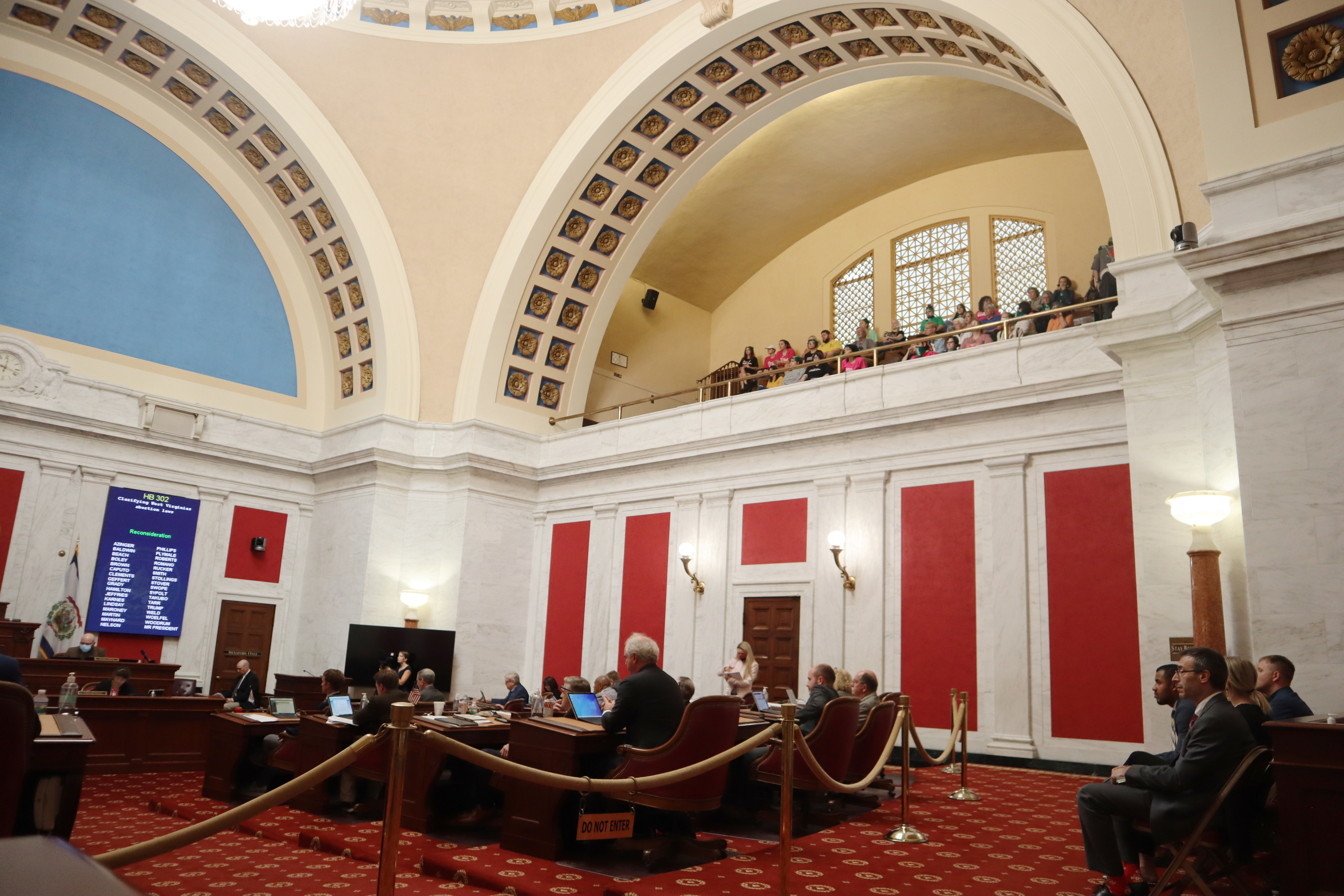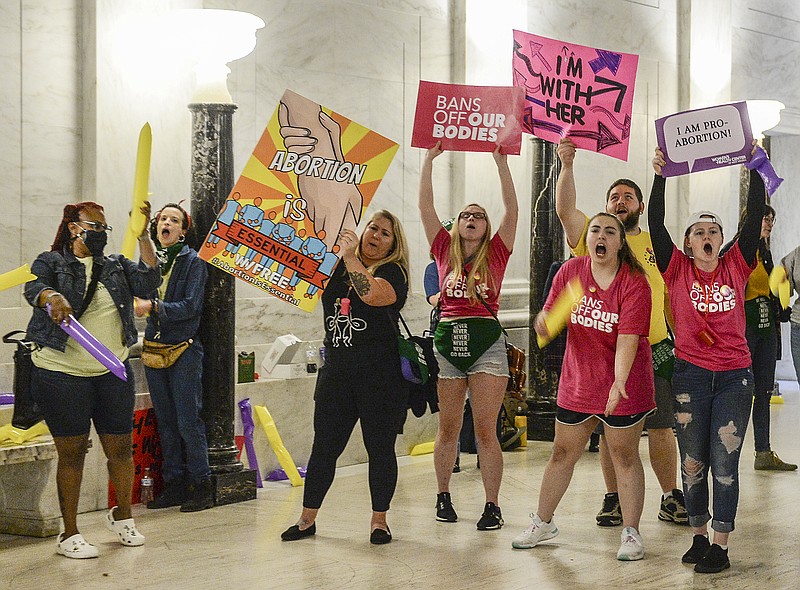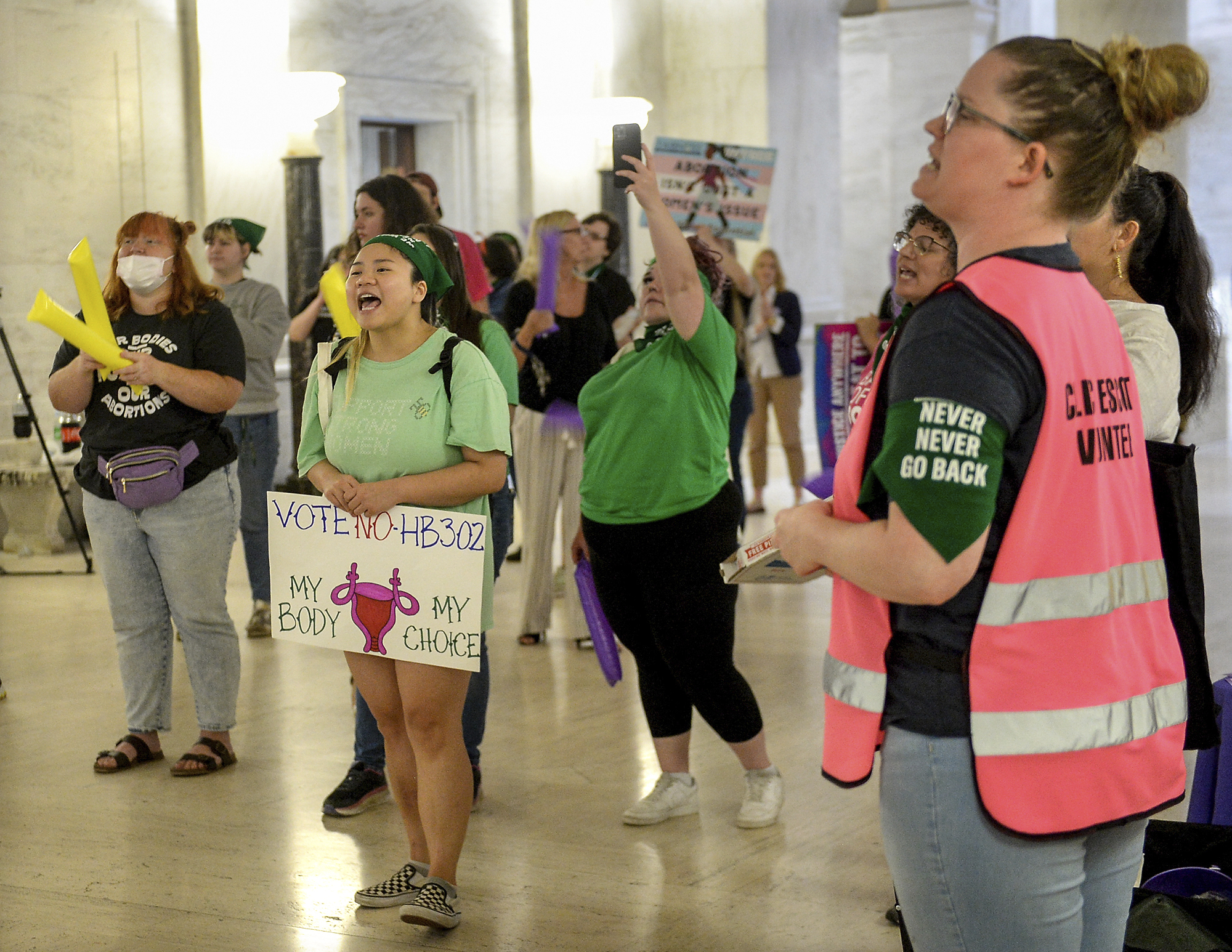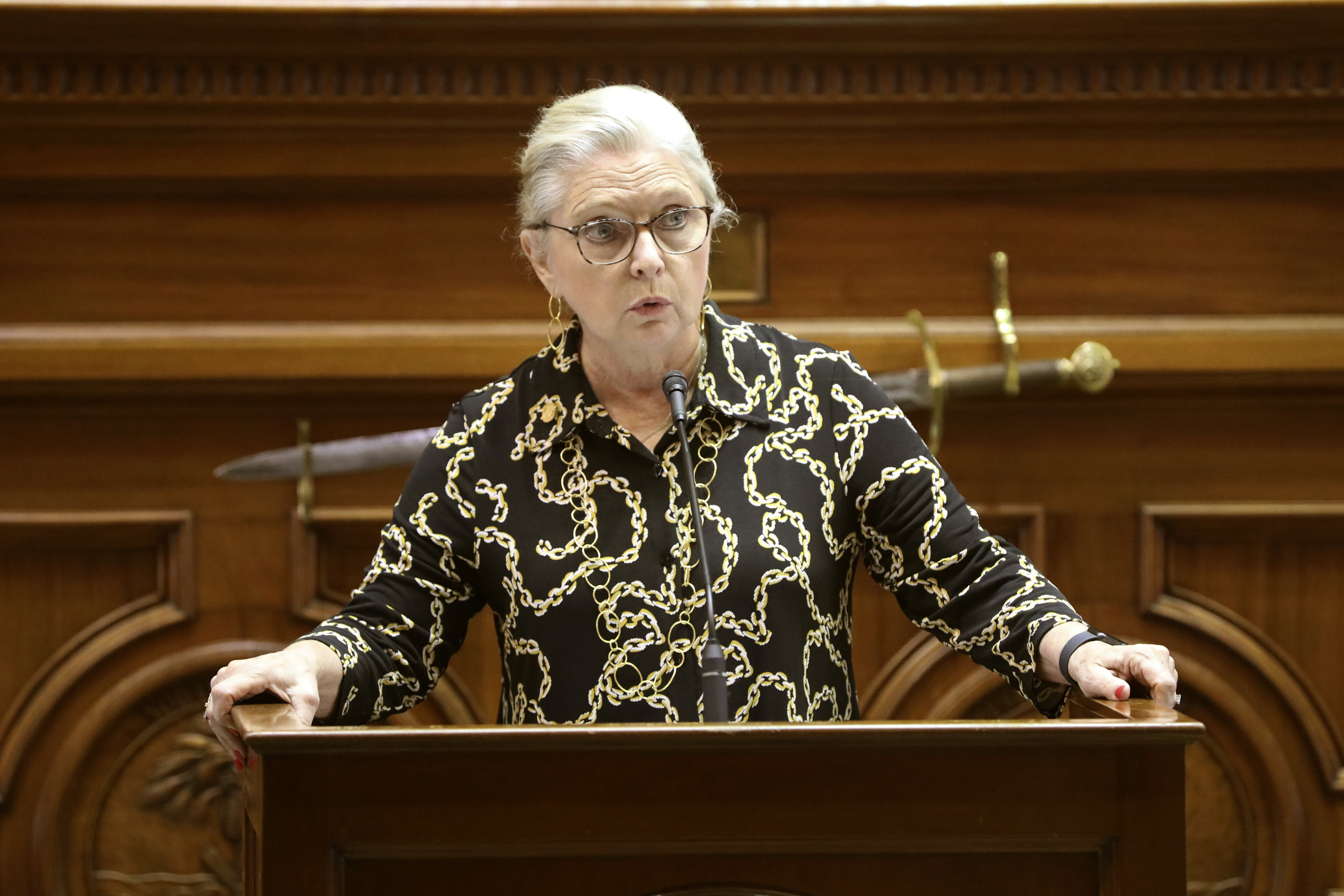CHARLESTON, W.Va. -- A gender divide has emerged in debates unfolding in Republican-led states, including West Virginia, Indiana and South Carolina, following the Supreme Court's June decision to end constitutional protections for abortion.
As male-dominated legislatures worked to advance bans, often with support of the few Republican women holding office, protesters were more likely to be women. The contrast wasn't lost on Owens Brown, the only Black lawmaker in the Republican-dominated West Virginia Senate, who asked lawmakers to look around before they passed a bill banning abortion at all stages of pregnancy last week.
"When I look around the room, what do I see? A bunch of middle-aged and some elderly men. Also, middle-income men," the Democrat said during a final Senate debate in which only men shared opinions. "Look out in the hallway. What do you see? You see young women. And we're here making a decision for all these young women because you're never going to have to ever face this issue yourself."
In all three states, lawmakers fighting against abortion bans have pointed to the gender divide, insisting that men shouldn't get to dictate medical decisions for women. Ban supporters say abortion affects not only women, but also children, and all of society.
"I am incredibly grateful to the men in my caucus, who were not afraid to stand up for life," said Republican Del. Kayla Kessinger of West Virginia. "They have just as much of a right to have an opinion on this as anyone else."
The gender gap was hard to miss as protesters descended on the West Virginia Capitol starting in July, when lawmakers first took up abortion. During a public hearing, dozens of women who showed up were given 45 seconds each to speak; several who went longer were escorted out by security.
Earlier this month, at least one woman was arrested and another dragged out of the chamber gallery by a group of male officers when she shouted "shame" at lawmakers during a debate.
After the bill passed, the House clerk read a lengthy resolution introduced by a white male lawmaker describing how society should view mothers. Motherhood is a privilege, it said, and shouldn't be treated as "a mere option."
"It was formerly a wisdom common to all participants of the abortion debate that no woman wants an abortion," the resolution states. Those with power over women "convince them to perform acts against their conscience."
The resolution didn't sit well with Roni Jones, a mother from the Charleston suburb of St. Albans.
"I'm tired of older, rich white men deciding our fate," she said, her voice hoarse from protesting. "They have no idea what working-class people go through."
Jones once had an abortion in the second trimester of a wanted pregnancy because of a medical issue, she said. While West Virginia's ban has exemptions for medical emergencies, rape and incest, those apply only early in pregnancy -- and she worries doctors will fear losing their license if they make a close call.
Her daughter, Catherine Jones, 25, said none of these decisions should be up to men, who will never experience pregnancy, childbirth or a miscarriage: "How can they truly empathize?"
BANS, EXCEPTIONS AND FRUSTRATION
In West Virginia, 18 of 134 lawmakers are women -- and 13 of them, all Republican, voted for the near-total abortion ban. In Indiana, 35 of 150 legislators are women; 14 voted for the bill there. In South Carolina, 29 of 124 legislators are women; seven voted for bans.
Indiana Republican Sen. Sue Glick sponsored the abortion ban that became law there. A House version was also proposed by a woman. But it was a male Democrat who pointed out the gender divide -- as in West Virginia.
"This is the government, the male-dominated government of the state of Indiana, saying to the women of this state, you lose your choice," Indiana Democratic Sen. Tim Lanane said when the Senate passed its ban.
Men have invoked wives, daughters and granddaughters during debates on rape and incest exemptions. Several said they needed to make a decision that allowed them to "sleep at night."
Female lawmakers in both parties have at times voiced frustration.
"To say it's tough to be a woman in politics is an understatement," South Carolina Sen. Katrina Shealy -- the body's longest-serving woman -- said on the Senate floor. "To say it's really tough to be a woman in politics in South Carolina is hardly a statement at all."
Shealy was one of three female Republican senators who opposed an effort to remove exceptions for rape and incest.
"Yes, I'm pro-life," she said. "I'm also pro-life for the mother, the life she has with her children who are already born."
South Carolina senators narrowly rejected a ban on almost all abortions this month. But Republican lawmakers plan to keep trying to enact new restrictions.
In West Virginia and Indiana, the bans passed were signed into law, although a judge has temporarily blocked enforcement of Indiana's ban. The state quickly appealed.
In West Virginia, Democratic Del. Kayla Young noted the lack of legislative representation not only of women but of people of color -- and those communities will be affected most by the ban, she said.
"We're never going to have to deal with this because we're incredibly privileged people," she said. "We are making decisions about other people, and we shouldn't do that. If it's your religious belief, if it's your moral belief, that is great for you. But get it away from me, get it out of my body, get it out of my uterus."
Democratic Del. Danielle Walker -- the only Black woman in the Legislature -- has acknowledged having an abortion. Walker often joined protesters between floor sessions, leading chants.
"Who do you think you are to tell me what I should do with my body, with my vagina, with my uterus, with my ovaries?" she said amid the crowd before walking into House chambers to vote against the bill.
Other legislators say the ban reflects what West Virginians want.
Republican Sen. Patricia Rucker supported the measure and was vocal in debates about ensuring victims of rape and incest who want abortions must report assaults to police. Though she wasn't involved in drafting the final version, she said her male colleagues shared their work and sought input.
Rucker said she feels she's carrying out voters' wishes. But opponents of restricting abortion say that can be known only through a statewide vote.
In 2018, 52% of voters approved a constitutional amendment saying that nothing in the state constitution "secures or protects a right to abortion or requires the funding of abortion."
In the wake of the Supreme Court decision, only Kansas voters have had a chance to weigh in on abortion. The traditionally conservative state voted to affirm the procedure as a right in the state constitution, with the support of an unprecedented increase in female registered voters.
A proposal by West Virginia House Democrats to put the abortion question to voters was rejected by Republicans on the day the ban passed. At least four states -- California, Kentucky, Michigan and Vermont -- could have votes in November on abortion access.
The day the West Virginia bill passed, Rucker and other female legislators let her male colleagues do the talking -- she felt she'd already had her say.
"I did not feel any reason to delay action of saving the babies when the West Virginia voters already spoke out," she said. "Voters knew when they elected me, I was 100% pro-life."
Information for this article was contributed by James Pollard, Jeffrey Collins, Arleigh Rodgers and Rick Callahan of The Associated Press.
 Protestors rally outside the Senate chamber at the West Virginia state Capitol in Charleston, W.Va., as lawmakers debated a sweeping bill to ban abortion in the state with few exceptions on Tuesday, Sept. 13, 2022. Several Republican lawmakers have said they hope the bill will make it impossible for the state's only abortion clinic to continue to offer the procedure. (AP Photo/Leah Willingham)
Protestors rally outside the Senate chamber at the West Virginia state Capitol in Charleston, W.Va., as lawmakers debated a sweeping bill to ban abortion in the state with few exceptions on Tuesday, Sept. 13, 2022. Several Republican lawmakers have said they hope the bill will make it impossible for the state's only abortion clinic to continue to offer the procedure. (AP Photo/Leah Willingham) West Virginia state senators debate a sweeping bill to ban abortion with few exceptions on the Senate floor in Charleston, W.Va., as onlookers watch from the gallery on Tuesday, Sept. 13, 2022. Several Republican lawmakers have said they hope the bill will make it impossible for the state's only abortion clinic to continue to offer the procedure. (AP Photo/Leah Willingham)
West Virginia state senators debate a sweeping bill to ban abortion with few exceptions on the Senate floor in Charleston, W.Va., as onlookers watch from the gallery on Tuesday, Sept. 13, 2022. Several Republican lawmakers have said they hope the bill will make it impossible for the state's only abortion clinic to continue to offer the procedure. (AP Photo/Leah Willingham)

